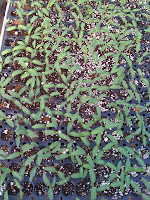This is by no means a history lesson as I very obviously left out vastly important happenings and peoples of this time period. Its just my impression after reading a great book about an adventure over 200 years ago through this little place I call home. By the way, when I quoted Captain Clark I corrected the very "liberal" spelling so popular in the 19th Century!
“There was no force on earth that could stop the flow of American pioneers westward. Good, cheap land was a magnet that reached all the way back to Europe. The pioneers were the cutting edge of an irresistible force.” Stephen Ambrose, Undaunted Courage
In 1803, it was official. President Thomas Jefferson doubled the size of the United States for a mere 3 cents an acre with his purchase of the territory of Louisiana. Widely criticized, Jefferson’s move was bold, some thought unconstitutional and many thought folly, plain and simple. Why add 828,000 acres to a country, in its infancy that had barely learned to govern the territory it already owned?
 |
| Tomato Seeds, Hurst Greenery 2012 |
 |
| Sprouts! |
I just finished reading Undaunted Courage, the Stephen Ambrose novel about Meriwether Lewis and the Corps of Discovery’s expedition. The expedition, ordered by President Jefferson, was his pride and joy. He was not disappointed as he read the Captain's diaries, rich with detail of the Missouri River and surrounding territory. As his crew paddled upstream in the muddy river, Lewis detailed the beauty of his surroundings, a place he and his crew had dubbed paradise.
I read with special significance the part of the journey through the lower Missouri. Clark says it well “We camped in the plain. One of the most beautiful plains I ever saw, open and beautifully diversified with hills and valleys all presenting themselves to the river covered with grass and a few scattering trees, a handsome creek meandering through.”
And if that wasn’t enough, he went the next night, “Spreading their lofty branches over pools, springs or brooks of fine water. Groups of shrubs covered with the most delicious fruit is to be seen in every direction, and nature appears to have exerted herself to beautify the scenery by the variety of flowers delicately and highly flavored raised above the grass, which strikes and perfumes the sensation, and amuses the mind.”
Jefferson was disappointed when the Northwest Passage failed to present itself, but he still had great plans for the territory that Lewis and Clark had explored. His great imagination planned for an orderly progression of settlers to slowly infiltrate the west. This, Ambrose details in his book, not the expedition itself, may have been Jefferson’s folly. Jefferson failed, most profoundly so, to understand the heart of the American.
 |
| Coming to a garden near you in spring 2012! |
The American of the early 1800s thirsted for new beginnings and land of their own. When word spread of the wonders Lewis and Clark had observed along the Missouri River, eager Americans packed their bags headed toward the bounty that waited. The paradise described in Lewis and Clark’s journal was the stuff of man’s dreams. Fertile lands and good water as far as the eye could see.
Today, this land once so widely prized, is no longer what most Americans dream of, unless of course, he or she happens to be snoozing while “flying over.” No culture, no diversity, no high rise condos or stoplights for that matter. Certainly no paradise, according to most.
But when I look outside my window, even this cold February, I still see what Lewis and Clark saw over 200 years ago. It’s still a land of plenty. Fertile land where even the most brown of thumbs can raise a juicy, red tomato. Blue skies and fresh air inhabited only by the occasional wind tower. A land where you can make a modest living and still own a home. A country where you can still be completely alone, with nature and with a gun in a tree stand if you so choose. A community where you can worship freely and without judgment. A place where families still do physical labor, together, working the land that returns the favor with generous bounty.
Most of all, I see a place where the independent spirit of Lewis and Clark is as fertile as the land where we live. It isn’t the land that changed after all. And its not too late for you to be a pioneer either.
No comments:
Post a Comment